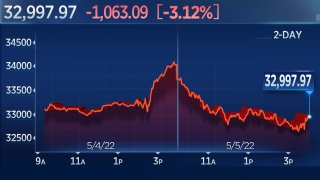
Stocks pulled back sharply on Thursday, completely erasing a rally from the prior session in a stunning reversal that delivered investors one of the worst days since 2020.
The Dow Jones Industrial Average lost 1,063 points, or 3.12%, to close at 32,997.97. The tech-heavy Nasdaq Composite fell 4.99% to finish at 12,317.69, its lowest closing level since November 2020. Both of those losses were the worst single-day drops since 2020.
The S&P 500 fell 3.56% to 4,146.87, marking its second worst day of the year.
Get Tri-state area news and weather forecasts to your inbox. Sign up for NBC New York newsletters.
The moves come after a major rally for stocks on Wednesday, when the Dow surged 932 points, or 2.81%, and the S&P 500 gained 2.99% for their biggest gains since 2020. The Nasdaq Composite jumped 3.19%.
Those gains had all been erased before noon in New York on Thursday.
"If you go up 3% and then you give up half a percent the next day, that's pretty normal stuff. ... But having the kind of day we had yesterday and then seeing it 100% reversed within half a day is just truly extraordinary," said Randy Frederick, managing director of trading and derivatives at the Schwab Center for Financial Research.
Money Report
Large tech stocks were under pressure, with Facebook-parent Meta Platforms and Amazon falling nearly 6.8% and 7.6%, respectively. Microsoft dropped about 4.4%. Salesforce tumbled 7.1%. Apple sank close to 5.6%.
E-commerce stocks were a key source of weakness on Thursday following some disappointing quarterly reports.
Etsy and eBay dropped 16.8% and 11.7%, respectively, after issuing weaker-than-expected revenue guidance. Shopify fell nearly 15% after missing estimates on the top and bottom lines.
The declines dragged Nasdaq to its worst day in nearly two years.
The Treasury market also saw a dramatic reversal of Wednesday's rally. The 10-year Treasury yield, which moves opposite of price, surged back above 3% on Thursday and hit its highest level since 2018. Rising rates can put pressure on growth-oriented tech stocks, as they make far-off earnings less attractive to investors.
On Wednesday, the Fed increased its benchmark interest rate by 50 basis points, as expected, and said it would begin reducing its balance sheet in June. However, Fed Chair Jerome Powell said during his news conference that the central bank is "not actively considering" a larger 75 basis point rate hike, which appeared to spark a rally.
Still, the Fed remains open to the prospect of taking rates above neutral to rein in inflation, Zachary Hill, head of portfolio strategy at Horizon Investments, noted.
"Despite the tightening that we have seen in financial conditions over the last few months, it is clear that the Fed would like to see them tighten further," he said. "Higher equity valuations are incompatible with that desire, so unless supply chains heal rapidly or workers flood back into the labor force, any equity rallies are likely on borrowed time as Fed messaging becomes more hawkish once again."
Stocks leveraged to economic growth also took a beating on Thursday. Caterpillar dropped nearly 3%, and JPMorgan Chase shed 2.5%. Home Depot sank more than 5%.
Carlyle Group co-founder David Rubenstein said investors need to get "back to reality" about the headwinds for markets and the economy, including the war in Ukraine and high inflation.
"We're also looking at 50-basis-point increases the next two FOMC meetings. So we are going to be tightening a bit. I don't think that is going to be tightening so much so that we're going slow down the economy. ... but we still have to recognize that we have some real economic challenges in the United States," Rubenstein said Thursday on CNBC's "Squawk Box."
Thursday's sell-off was broad, with more than 90% of S&P 500 stocks declining. Even outperformers for the year lost ground, with Chevron, Coca-Cola and Duke Energy falling less than 1%.






